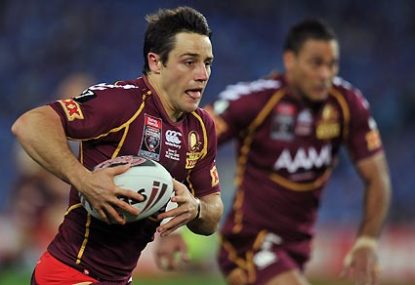'He's been put to sleep': Freddy calls out 'bored' Raiders winger in simple Nicho Hynes 40/20
The Sharks halfback backed it up with a try from a few seconds later, through some more tired Canberra defenders.

Earlier five o’clock shadows, glorious autumn afternoons and State of Origin – you know it’s that time of year when you read the discussion about whether or not certain players should be suspended for rugby league’s grandest stage.
Sure enough, last weekend there were a few incidents from the club matches which gave both sets of supporters a few shivers.
Cooper Cronk upended a bloke and, given the NRL’s recent crackdown on dangerous throws, there was rightly a fair bit of conjecture over a potential Origin-cruelling ban.
David Shillington clipped Steve Matai with a lazy arm early in the Raiders’ loss to Manly.
Anthony Watmough retaliated to Dane Tilse’s provocation in the 80th minute of the same match and found himself belting on for a few seconds, before a well-advised teammate grabbed him, pulled him away and appeared to whisper in Watmough’s ear words along the lines of, “Whoa mate, careful, you’ve got Origin next week.”
None of those players were suspended for their infractions, and rightly so.
Cronk’s tackle was a bit careless but owing to his past good record, did not deserve time off.
Shillington’s arm was even less careless and certainly not malicious, and Watmough…well, I don’t advocate fights in rugby league, but if you’re going to suspend people for that one, it’ll be a busy judiciary between now and September.
However, the bigger issue is the application of suspensions received in one competition to those received in another.
It is a poorly-drafted rule mandating a player suspended from an incident in a club match is to be banned from a representative fixture if it falls during the suspension period.
It doesn’t happen in other major sporting codes, so why should it happen in rugby league?
An example of how suspensions should be applied is European football.
Let’s say a Chelsea player is sent off in the Premier League. He has a Champions League match a few days later. His mandatory one-match suspension (along with any additional suspension) is served in the Premier League because it was incurred in the Premier League.
He’s free to play the Champions League match. And, should it happen, the reverse applies.
International football also provides guidance.
A player sent off in a World Cup qualifier is generally not required to serve his suspension in club football – he is required to serve it in the World Cup qualifiers or the World Cup itself (whichever matches are on until his suspension is completed).
Why the NRL doesn’t adopt the same system is curious.
Under a better system, suspensions arising from club matches would be served in club matches, leaving players available to be selected for representative games, and suspensions arising from representative games would be served in the same level of representative game (i.e. City-Country, State of Origin or Test, depending where the suspension was incurred).
To develop the idea further, there ought to be separate judiciary panels for each different level of competition – NRL, City-County, State of Origin and Test.
This would solve two problems.
Firstly, it would rid the game of any prospect of loopholes a la Lote Tuqiri in 2002 and Tonie Carroll in 2006.
A smart administrator can probably find a way around ambiguous rules like these.
Secondly, it would ensure that the pre-Origin discussion is never again going to be blighted by accusations of judiciary bias (as was the case in 2011 when David Taylor and Akuila Uate were given wildly differing suspensions for similar offences).
There are at least three counter-arguments I’ve heard so far and I’ll address each.
Counter-argument 1: “It’s not a good look for the game if you allow a player who has viciously fouled another player to avoid suspension for a representative fixture, even though he’s been suspended for club matches”.
See my discussion above of the way suspensions in international and club football work – if it’s good enough for soccer, why not rugby league?
Counter-argument 2: “A player who is retiring after the Origin series will just go out and belt people in Game Three with no deterrent besides a penalty.”
Two things to say about this: firstly, there is a penalty – it’s called the send-off, and referees ought not be afraid of using it (although that’s another argument).
Secondly, how is this any different from a player’s last club game?
Ask former Brisbane Lion Alastair Lynch about that one – the AFL suspended him after his 2004 grand final fracas with basically the whole Port Adelaide team, but knowing he was retiring, also fined him $15,000.
Good move.
Counter-argument 3: “State of Origin is representative, where players are chosen from their clubs, are all registered with the same competition and therefore should be subject to the same rules across both.”
The fact is that although the players all play together in the one week-to-week league, Origin is a different class of football. Origin results don’t affect the NRL table and vice versa.
Accordingly it’s incongruous to punish a representative team for the actions of one of its players committed in a club game, and likewise it would be wrong for a club to be punished for something one of its players did while not playing for that club.
A counter-argument can be raised to this counter-argument as well: while all Origin players come from the NRL, the same cannot be said for Test footy, where NRL suspensions (as far as I’m aware) also apply.
In my mind this is an interesting topic with a clear-cut solution. Looking forward to hearing the views of others.
And – if you’ll pardon my indulgence – go the Blues!